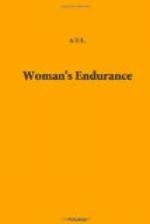It would perhaps be well to state here my attitude towards the authorities in Camp.
It did not take me very many days to see exactly how things stood, and I determined to have absolutely nothing to do with these men: to ask no favours, and to be under no obligation to them for anything. Of course, there came days when I was forced, under stress of circumstances, to eat these resolutions.]
[Footnote 30: Martie Snyman.]
[Footnote 31: My great zeal in this matter led me to be rather severe and inconsistent; just the same as a teacher who will stand no excuses from his pupils.]
[Footnote 32: Betty Lotz.]
[Footnote 33: This child of four years gnashed all her teeth to pieces before she died. She obstinately refused all nourishment, and told her mother she did not want to live longer. She was indeed a marvel. I gave the mother beef tea, which was all this child lived on for two weeks. The mother used deceitfully (!) to give it beef tea when it called for water.]
[Footnote 34: On the ground.]
[Footnote 35: Aunt; she was really the grandmother, though. Reference is made later to this same case.]
[Footnote 36: For cocoa.]
[Footnote 37: These ladies never approached me, and yet they might have known that I would naturally know more about the state of the Camp than anyone else. The Superintendent led them about—where he chose, I suppose. They were regarded with universal contempt by the people. Their report I have not yet seen, but I know this: that the Superintendent was not immediately dismissed as he should have been. (This was only done in December.) Perhaps the subsequent extension of the hospital and removal to a better site were due to these ladies’ suggestions. I remember, though, that we had quite decent meat (beef) during the few days that they visited the camp.]
[Footnote 38: I had brought with me six tins syrup, a few tins jam, 1 lb. of tea, and a little oatmeal.]
[Footnote 39: The Rev. J. Steytler, who had also gone to labour in a camp. He was sent away for political reasons.]
[Footnote 40: This was my daily dilemma: Speak out and protest, and be removed or imprisoned—hold silence and [Transcriber’s note: illegible word] the coward, and remain in the work. And I chose the latter.]
[Footnote 41: The rule was that a card, with the number of any tent where medical attendance was desired, should be pinned to the Chemist’s Tent before a certain hour in the morning. Many chose to have no attendance, so great was their fear and dread for two of the doctors. Many, too, in spite of their cards, were never visited.]
[Footnote 42: Dutch idiom, literally translated, “pull through.”]
[Footnote 43: This calamity, fortunately, only cast its shadow—it never fell. The Rev. Mr. Becker used to come over every afternoon, and continued this labour of love until the end of November, when he was prohibited from visiting the camp any more. How faithful he was! How well I remember the little figure in black flitting hither and thither among the tents. We seldom met in camp, but many a time I smuggled into a tent where I had seen him enter, just to learn from him to pray.]




